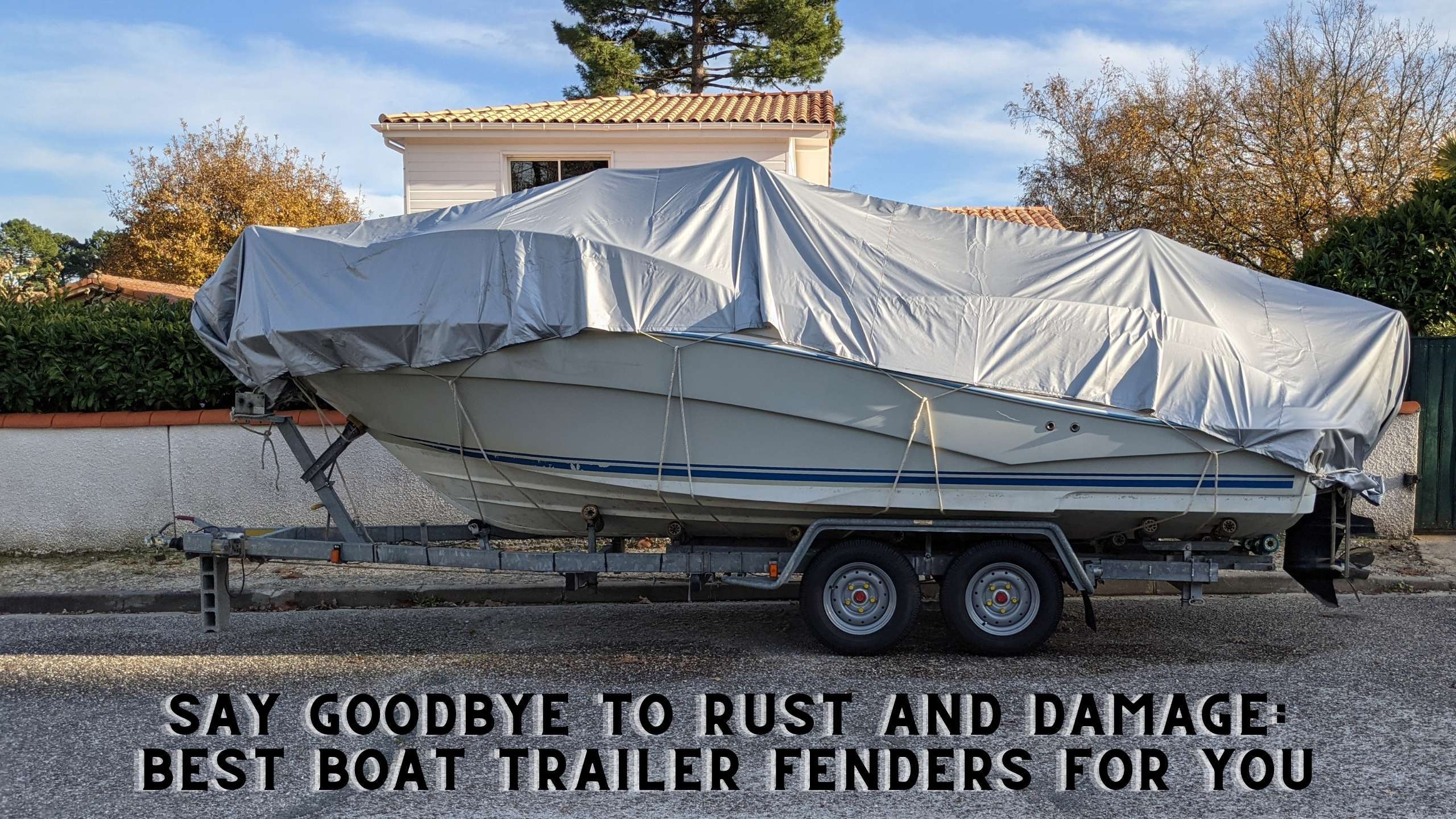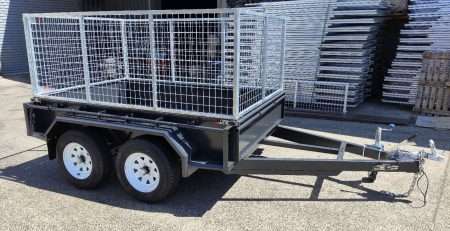
Say Goodbye to Rust and Damage: Best Boat Trailer Fenders for You
Understanding Trailer Fenders
When it comes to maintaining and protecting your boat and trailer during transportation and storage, boat trailer fenders play an essential role. These components are often overlooked but are crucial for the longevity and aesthetic appeal of your boat and trailer.
Purpose of Boat Trailer Fenders
Boat trailer fenders are designed to protect both the boat and the trailer from damage during transportation and storage. They protect the trailer from damage due to rocks, debris, and other road hazards (West Marine). Another added advantage is that they provide a stepping point for accessing both the boat and trailer (source). By guarding against these potential hazards, fenders help to extend the lifespan and maintain the condition of your investment.
Types of Trailer Fenders
Boat trailer fenders are typically made from durable materials such as plastic, rubber, or aluminium, which can withstand impacts and resist corrosion (Discover Boating). The choice of material depends on various factors, such as the type of trailer, the environment, and personal preference.
Furthermore, fenders come in different styles and configurations to accommodate different types of trailers. For example, single-axle fenders are suitable for single-axle trailers, while tandem-axle fenders are designed for tandem-axle trailers.
The array of available fender types includes:
- Aluminium trailer fenders
- Utility trailer fenders
- Diamond plate trailer fenders
- Plastic trailer fenders
- Steel trailer fenders
Each type has its own unique advantages and is best suited for specific situations. Your choice should reflect the needs of your trailer and the conditions in which it operates. Understanding these factors will guide you in choosing the best fenders for your boat trailer. For more options, you can browse through our collection of trailer fenders for sale.
Choosing the Right Fender
When it comes to selecting the most suitable boat trailer fenders, there are a few key points to consider. The fenders should be durable enough to protect your boat and trailer from debris and be well-positioned to serve as a stepping point for accessing your boat and trailer. In this section, we will discuss the factors to consider when choosing fenders and how to determine the right size and positioning for them.
Factors to consider
There are several elements to take into account when shopping for boat trailer fenders. Firstly, consider the size and weight of the boat being transported. The fenders should be sufficiently robust to withstand any potential impact and protect both the boat and the trailer from damage during transportation and storage. Discover Boating.
Boat trailer fenders come in different styles and configurations, including single axle and tandem axle fenders, to accommodate different types of trailers. The style of fender selected should match the type of trailer you have.
The material of the fender is another important factor. Fenders can be made from various materials, including aluminium, plastic, and steel. Each material has its own set of benefits and drawbacks, so consider your specific needs and preferences when making a choice.
Finally, consider how the fenders will be attached to the trailer. They should be securely attached to the trailer frame using bolts or screws. Discover Boating. Some providers, such as BoatTrailerParts.com, offer boat trailer fender mounting brackets for easy installation.
Sizing and positioning
The size and positioning of boat trailer fenders play a crucial role in their effectiveness. The fenders should be properly sized and positioned to provide sufficient coverage and protection for the boat and the trailer.
To determine the appropriate size for your fenders, measure the diameter of your trailer wheels. The fenders should be wide enough to cover the full width of the tire. The height of the fender should be such that it covers about half of the height of the tire. This ensures that the fender effectively blocks debris from hitting the boat while also providing a sturdy stepping point when accessing the boat.
In terms of positioning, the fenders should be mounted directly over the wheels of your trailer. This ensures that they provide maximum protection and coverage. The fenders should be installed in such a way that they are sturdy and do not move or wobble when the trailer is in motion.
Selecting the right boat trailer fenders involves careful consideration of various factors. By keeping these points in mind, you can ensure that you choose the best fenders for your needs. Don’t forget to regularly inspect and maintain your fenders to ensure their longevity and effectiveness. Visit our page on trailer fenders to explore more options.
Material and design choices
When it comes to selecting the best boat trailer fenders, the choice of material and design are crucial considerations. These factors play an important role in the durability, functionality, and aesthetics of the fenders.
Common Materials
Boat trailer fenders are typically made from durable materials such as plastic, rubber, or aluminium, which can withstand impacts and resist corrosion (Discover Boating). Each material has its own benefits, and the choice often depends on the specific requirements of the boat owner.
- Plastic Fenders: lightweight, affordable, and resistant to rust. However, they may not be as robust as other options.
- Rubber Fenders: Known for their durability and impact resistance, they can degrade over time due to exposure to the elements.
- Aluminium Fenders: lightweight, durable, and rust-resistant. They are ideal for boats due to their durability and resistance to marine conditions.
BoatTrailerParts.com offers a wide range of boat trailer fenders made from various materials. You can check out their selection to find the perfect match for your trailer.
| Material | Pros | Cons |
|---|---|---|
| Plastic | Lightweight, affordable, and rust-resistant | May not be as robust. |
| Rubber | Durable, Impact-resistant | Can degrade over time. |
| Aluminium | Lightweight, durable, and rust-resistant | Can be more expensive. |
Fender Styles and Configurations
Along with the material, the style and configuration of the fender are also significant. The style often depends on the type of trailer and the size of the tyres it’s designed to protect.
For instance, aluminium diamond plate single-axle trailer fenders are most commonly found and sold for boat railers. They are also suitable for enclosed trailers or utility trailers (source). The aluminium construction is completely ideal for boat trailers because the fender is lightweight, durable, and will not rust! These are commonly seen protecting 13- to 15-inch trailer tyres (source).
Remember, the fender style should complement the design of your trailer and fulfil the protective function effectively. You can check out various fender styles, such as single-axle trailer fenders and tandem-axle trailer fenders, to determine the best fit for your trailer.
Choosing the right material and design for your boat trailer fenders is a critical step in maintaining the longevity and performance of your trailer. Make sure to consider all these factors before making a purchase. For additional options, browse our collection of trailer fenders for sale.
Installation and maintenance
Ensuring that your boat trailer fenders are correctly installed and well-maintained is essential for their effective operation. In this section, we’ll discuss the importance of secure attachment and provide some key tips for inspecting and maintaining your fenders.
Secure Attachment of Fenders
Proper installation of boat trailer fenders is crucial to ensuring they provide adequate protection. According to Discover Boating, fenders should be securely attached to the trailer frame using bolts or screws.
This secure attachment helps to ensure that the fenders do not come loose while in transit, which could lead to damage to both your boat and trailer. Furthermore, fenders should be properly sized and positioned to provide sufficient coverage and protection for the boat and the trailer.
Depending on the type of trailer, you may require different types of fenders. For instance, tandem axle trailer fenders are designed for trailers with two axles, while single axle trailer fenders are suitable for trailers with only one axle.
Inspecting and maintaining fenders
Just like any other part of your trailer, regular inspection and maintenance of boat trailer fenders are necessary to ensure their effectiveness and prolong their lifespan. Discover Boating recommends checking for any signs of damage, such as cracks or dents, and repairing or replacing the fenders if necessary.
Maintenance can include cleaning the fenders to remove any dirt or debris, checking the bolts or screws to ensure they are tight, and inspecting the fender for any signs of wear or damage. If you notice any issues during your inspection, it’s important to address them as soon as possible to prevent further damage.
If your fenders are damaged beyond repair, it might be time to look for new trailer fenders for sale. There are many different options available, from aluminium trailer fenders and steel trailer fenders to plastic trailer fenders and diamond plate trailer fenders, so you’re sure to find something that fits your needs.
By taking the time to properly install and maintain your boat trailer fenders, you can help ensure that they continue to provide the protection your boat and trailer need for many years to come.
Potential Issues and Solutions
Even with the best boat trailer fenders, problems might arise. It’s key to identify common issues and understand when it’s time to replace your fenders. This way, you can avoid unnecessary damage to your boat and trailer.
Common Problems with Fenders
Fenders are an essential part of a trailer, as they protect the boat and trailer from debris and provide a stepping point for accessing both the boat and trailer. However, they can face several challenges. The most common problems include:
- Loose Fenders: Boat trailer fenders should be securely attached to the trailer to ensure they do not come loose while in transit (West Marine). A loose fender can lead to accidents or damage to your boat and trailer.
- Physical Damage: Fenders can get damaged from impacts with debris, kerbs, or during loading and unloading of the boat. Dents, cracks, or broken parts can compromise the effectiveness of the fender.
- Corrosion: Although boat trailer fenders are typically made from durable materials such as plastic, rubber, or aluminium, which can resist corrosion, they might still suffer from it over time, especially in harsh weather or saltwater conditions.
- Inadequate Coverage: Fenders that are too small or improperly positioned might not provide sufficient coverage and protection to the boat and the trailer (Discover Boating).
Regular inspection and maintenance of boat trailer fenders is important to ensure their effectiveness and longevity. This includes checking for loose parts, physical damage, corrosion, and ensuring adequate coverage.
When to Replace Your Fenders
Knowing when to replace your fenders can save you from potential headaches and costly repairs. It’s time to consider replacing your boat trailer fenders if:
- The fender has significant physical damage, like large dents, cracks, or broken parts.
- There is severe corrosion that neither cleaning nor painting can fix.
- The fender is no longer securely attached to the trailer and cannot be properly reattached.
- The fender no longer provides adequate coverage due to damage or an incorrect size.
Replacing trailer fenders requires narrowing down the search based on basic observations and measurements (source). You’ll want to consider the size of the fender, the material it’s made from, and the style and configuration that best suit your boat and trailer.
If you’re in the market for new fenders, check out our selection of boat trailer fenders. Whether you need single-axle trailer fenders, tandem-axle trailer fenders, or aluminium trailer fenders, we have options to suit your needs.
Finding the Right Fender Provider
Choosing the right provider for your boat trailer fenders is just as important as selecting the appropriate fenders. A reliable provider can offer you a wide range of options, expert advice, and excellent customer service.
Factors to consider
When choosing a provider for your boat trailer fenders, there are several factors to consider:
- Selection: The provider should offer a wide range of fender options, including different materials and designs, to suit different preferences and needs. For example, BoatTrailerParts.com offers a comprehensive selection of boat trailer fenders.
- Additional Parts and Accessories: It’s beneficial if the provider also offers a variety of other boat trailer parts and accessories, such as axles, hubs, brakes, lights, and tires. This can save you time and effort in sourcing these items from different suppliers.
- Information and Support: The provider should offer ample information about each product, including detailed specifications, installation instructions, and maintenance tips. They should also provide customer support to assist you in making the right choice and address any concerns you may have.
- Reputation: Check the provider’s reputation by reading customer reviews and testimonials. This can give you an idea of the quality of their products and the standard of their customer service.
The Role of Professionals
Professional advice can be invaluable when selecting the right boat trailer fenders. Experts can guide you in choosing the appropriate size, material, and design based on your specific needs and preferences. They can also provide installation instructions and maintenance tips to ensure the longevity of your fenders.
BoatTrailerParts.com provides a wide range of boat trailer fender options and offers professional advice and support. They also provide a variety of other boat trailer parts and accessories, making them a one-stop-shop for all your boat trailer needs.
In conclusion, finding the right boat trailer fender provider involves considering several factors, including the selection of fenders, the availability of additional parts and accessories, the provision of information and support, and the provider’s reputation. With the right provider, you can ensure that your boat trailer is equipped with the best fenders to protect it from damage and rust.
Author
I am Rahatul Ashiq Tamal. Another author of Muscle Trailers. Muscle Trailers is a well-known trailer brand in Sydney, Melbourne & Adelaide

How to Mount a Spare Tire on Your Trailer: A Simple Step-by-Step Guide
Trailer service centers receive over 1 million phone calls and 1.3 million emails each year about trailer maintenance problems....

How to Fix RV Roof Leaks: Simple Roof Leak Detection Guide for Beginners
Did you know DIY RV roof repairs can cost under $50? But undetected leaks could lead to substantially higher repair...

Starting a Food Truck Business in Australia: From Trailer Selection to Launch
The Australian mobile food market has evolved into a billion-dollar industry. This makes a food truck...
